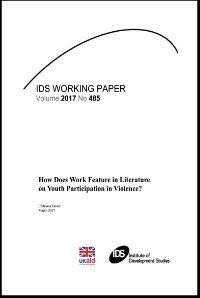How Does Work Feature in Literature on Youth Participation in Violence?
By Caitriona Dowd.
This paper explores the evidence available on the role of work in youth participation in violence, through a study of recent research and evidence in this field. The evidence review considers the role of ‘work’ broadly, seeking to go beyond restricted definitions of waged and formal sector employment or underemployment. It considers the role of formal and informal work, different forms of work, and the various potential roles – both positive and negative – that work may play in youth participation in violence. The study will also employ a broad definition of ‘violence’ – considering youth participation in organised, mass-mobilised conflicts; ‘radicalised’ or ‘extremist’ violent groups; less formal, criminal violence; and, where relevant, interpersonal violence. The deliberately broad definition of violence facilitates a focused analysis of the evidence and research surrounding the role of work in youth engagement in all forms of violence that constitute a disengagement from a peaceful social order, recognising the interlinkages between multiple and varied outward manifestations of violence (for example, criminal, economic, political and interpersonal violence). The study explores the evidence for the role of work in youth violence participation at the intersection of multiple forms of work, multiple forms of violence, and multiple forms of participation, mapping gaps in existing research and evidence, and opportunities for further research and analysis. Attention will be concentrated on research and evidence produced after 2010, building on the work of Cramer (2010) on unemployment and violence.
Brighton, UK: Institute of Development Studies, 2017. 30p.


